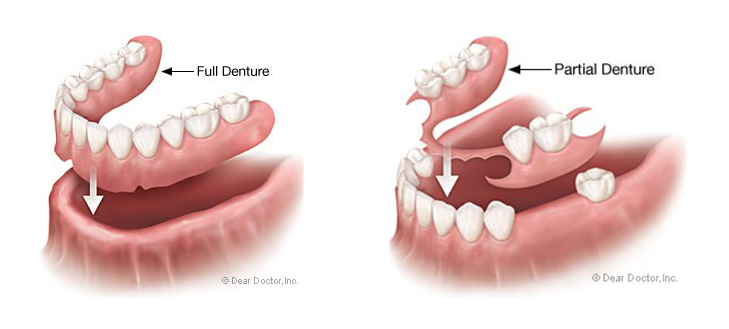
Dentures are a replacement for missing teeth. If you have lost all your natural teeth from periodontal disease, tooth decay or injury, complete dentures can replace your missing teeth and return your smile. Replacing your missing teeth will benefit your appearance and your health. Without support from the denture the facial muscles sag and lips sink inward making you appear older. You will be able to eat and speak things that people often took for granted until their natural teeth are lost.
Removable Full dentures replace all of the teeth.
Removable Partial dentures replace some of the teeth.

Once you get your new set of dentures, you will experience changes in your mouth. For example, you will produce more saliva than usual and have sore spots from the dentures. Fortunately, your mouth will quickly adjust to restorations, easing discomfort.
After the procedure for dentures, the dentist will advise you on caring for your mouth. For instance, they will tell you when to remove the dentures, what to eat, and how to clean your mouth. In addition, they will schedule follow-up visits to ensure you do not have gum infections. It will take a few weeks before you can talk and chew comfortably with your dentures.
The dentist will ask you to wear your new dentures for 24 hours after getting them. It helps reduce bleeding and swelling and helps your mouth adjust to the dentures. This means
that you will sleep in them for a night. However, you must not wear them any other night as they may lead to thrush, stomatitis, or gingivitis.
Yes, dentures will dramatically change your facial appearance. Tooth loss causes your cheeks and lips to droop, causing you to look old. Customized dentures support sagging facial muscles and correct their height. As a result, they willl restore proportion to your face.
No you shouldn’t wear your dentures while sleeping. That’s because they can easily become loose and cause a lot of discomfort and irritation. Moreover, dentures can also interfere with your breathing especially if they are not fitted properly. Wearing your dentures to sleep is likely to lead to oral issues such as gum disease.